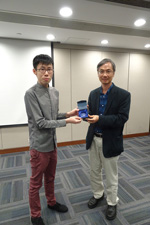The CUHK–Chiang Ching-kuo Foundation Asia-Pacific Centre for Chinese Studies (APC) organised a series of public lectures from September to December with the aim of providing a platform to promote academic exchanges in Chinese Studies. In September, Xie Xiaohui, a Research Fellow of Sun Yat-Sen University, was invited to talk about "Competing for Orthodoxy: Territorial Kings and the Creation of Lineages among the Tujia". In October, Dr Tsui Kai Hin Brian (Assistant Professor, Department of Chinese and Culture, The Hong Kong Polytechnic University) delivered a lecture entitled "From Civilisational Exchange to Diplomacy between Nation-states: Cheena Bhavana and the Pacific War". Professor Ji Zhe's public lecture in December will focus on "New Buddhist Movements and The Reflexive Globalisation". 1. Dr. Xie Xiaohui: Competing for Orthodoxy: Territorial Kings and the Creation of Lineages among the Tujia  Dr Xie received her B.A and M.Phil. from Sun Yat-Sen University and completed her doctorate at The Chinese University of Hong Kong. She serves as a Research Fellow at The Department of History of Sun Yat-Sen University. She has also held the position of Research Assistant Professor at Division of Humanities of The Hong Kong University of Science and Technology. Her main research interest is the boarderlands and ethnic groups in Ming-Qing Southwest China; major publications include and many others journal articles. She is also a main editor of Negotiating Frontier (2016). Dr Xie received her B.A and M.Phil. from Sun Yat-Sen University and completed her doctorate at The Chinese University of Hong Kong. She serves as a Research Fellow at The Department of History of Sun Yat-Sen University. She has also held the position of Research Assistant Professor at Division of Humanities of The Hong Kong University of Science and Technology. Her main research interest is the boarderlands and ethnic groups in Ming-Qing Southwest China; major publications include and many others journal articles. She is also a main editor of Negotiating Frontier (2016).
During the lecture, Dr Xie discussed three major issues. She shared with us the mechanism of nationality classification in China during the 1950s. She also discussed how the Tujia was recognized as Han people in late Qing and Republican China, and why the Tujia was further classified as one part of Han people and culture in the "Nationality Classification Project" in the 1950s. Last but not least, Dr Xie talked about how to understand the unification and variety of Tuijia culture and how Tujia culture integrated with Han culture. 2. Professor Tsui Kai Hin: From Civilizational Exchange to Diplomacy between Nation-states: Cheena Bhavana and the Pacific War  Professor Tsui Kai Hin is currently Assistant Professor at the Department of Chinese Culture, The Hong Kong Polytechnic University. A historian of modern China, Professor Tsui is interested in the intersection between conservatism, revolutionary politics and the mobilization of cultures in the Republican period. His research explores mass politics, the dilemmas confronting liberal intellectuals caught between an authoritarian Nationalist state and a supposedly untamable populace, and the Nationalist Party's appeal to Pan-Asianism as a strategy to garner international support. His other research interest is China-India relations in the first half of the twentieth century. Professor Tsui Kai Hin is currently Assistant Professor at the Department of Chinese Culture, The Hong Kong Polytechnic University. A historian of modern China, Professor Tsui is interested in the intersection between conservatism, revolutionary politics and the mobilization of cultures in the Republican period. His research explores mass politics, the dilemmas confronting liberal intellectuals caught between an authoritarian Nationalist state and a supposedly untamable populace, and the Nationalist Party's appeal to Pan-Asianism as a strategy to garner international support. His other research interest is China-India relations in the first half of the twentieth century.
During the lecture, Professor Tsui shared with us the establishment of Cheena Bhavana founded by Tan Yunshan. Professor Tsui discussed Tan Yunshan's ideal for civilizational exchange between the East and the West and his cultural politics. From Tan Yunshan's example, Professor Tsui pointed out the dilemma when civilizational exchange encounters diplomacy between nation-states, and he concluded that the ideal of civilizational exchange actually gave in to the diplomacy between nation-states and encountered temporary setback in the case of Cheena Bhavana. 3. Professor Ji Zhe: New Transnational Buddhist Movements and the Reflexive Globalization  Ji Zhe is associate professor of Chinese studies at the Institut national des langues et civilisations orientales (INALCO) in France. His main study areas are the contemporary evolution of Buddhism and the relationship between state and religion in China. He edited a collective volume entitled Religion, éducation et politique en Chine modern (2011) and guest-edited with Vincent Goossaert a special issue of Social Compass on Buddhism in post-Mao China (2011). Ji Zhe is associate professor of Chinese studies at the Institut national des langues et civilisations orientales (INALCO) in France. His main study areas are the contemporary evolution of Buddhism and the relationship between state and religion in China. He edited a collective volume entitled Religion, éducation et politique en Chine modern (2011) and guest-edited with Vincent Goossaert a special issue of Social Compass on Buddhism in post-Mao China (2011).
During the lecture, Professor Ji reviewed the globalization of Chinese Buddhism and introduced two examples of new transnational Buddhist movements to discuss the sociological significance of these movements in the context of globalization. |















